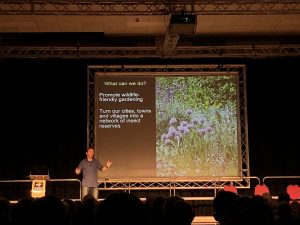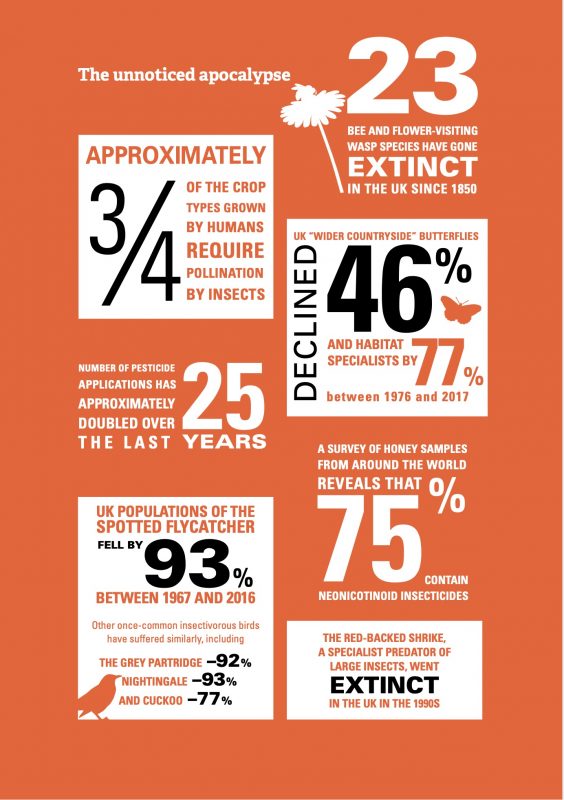Prof Dave Goulson giving the North Wales Wildlife Trust’s Lacey Lecture
I was very fortunate enough to attend a lecture by Prof Dave Goulsons ‘Averting the Insect Apocalypse’ on behalf of the North Wales Wildlife Trust’s, annual Lacy Lecture last night, followed by signings of his latest book ‘ The Garden Jungle: or Gardening to Save The Planet’. In this case, the book’s tagline is most appropriate with its hidden and serious undertones. I will be giving a review of it shortly.

A serious message delivered in a pleasant easy-going style
The presentation is split into two parts, the first, is rather gloomy and basically provides a diagnosis of the state of the earth and the second could be described as a prognosis.
Dave stated that there have been several recent scientific reports describing the rapid decline of insects on a global scale, summarised by Sanchez-Bayo and Wyckhuys 2019. Recently in Germany, a study found that there had been more than 75% decline over 27 years in flying insect biomass. Although no such detailed studies have taken place here as regards insect biomass, there is other data for butterflies and moths, both of which are declining. The best example I can give for other insects is, nowadays gone are the days when a drive through the countryside would entail you having to wash the car windscreen from all the insects that had been splattered on it. Do you remember those days? The story taken up by the BBC had the headline ‘Splatometer’ to count bug life. The former environment editor of the Independent noticed the same thing – he has even written a book about it, The Moth Snowstorm.
Extinction
We tend to focus on the larger mammals and birds when we think of extinction. I suspect that’s because we see them or are much more aware of it because of television or the media. However, it appears that the smallest things that we can see, insects/invertebrates, are suffering at a far greater rate which will have a far greater negative impact on the planet and as a result of this, on us too. He stated that on average it’s likely that at least one species is becoming extinct every hour somewhere in the world. That’s mind-blowing. Things may become extinct before we are even aware of them. How sad is that?
Reasons for the decline
A list of causes was talked about, including the usual suspects of habitat loss, pesticides and climate change being strong contenders. With other less important stressors such as invasive species, light pollution and the latest one I heard the other day was noisy and polluting leafblowers were found in a report issued by the German Ministry for the Environment to be fatal to insects.
Bird Food
As many of you know, there are many species of garden bird that eat insects/invertebrates and many that eat seeds. What you may not know is that even some seed-eaters, such as house sparrows, have to feed their very young chicks invertebrates e.g. aphids, caterpillars or beetles, all of which are an important source of protein. Without them, these chicks would probably starve. So when you spray your roses against aphids, are they more important than your local house sparrow population?
Thankfully, part two was more hopeful! With a collective call to action, which if we act together we can reverse insect decline. For example, mow your lawn a little less often, grow wildflowers, leave areas a little less tidy, grow some vegetable or fruit and if you are an avid weeder, just call your weeds wildflowers! Besides free pollination services, insects form the cornerstone of all terrestrial life. Believe it or not, we actually depend upon them. It’s not the other way around!

We need insects!
Download the report
If you cannot attend one of these important, interesting and enlightening presentations you can download the report by Professor Dave Goulson, FRES here ‘Insect declines and why they matter‘. With thanks to the North Wales Wildlife Trust who hosted this important lecture and uploaded the report.
Waiting for more evidence?
Of course, if you simply do not believe in this, need more evidence of a more globalised decline not just geographically localised declines, decide that there are many more insects yet to be discovered then more data can be collected, the very least is that the topic is being aired and debated, bringing it to the attention of many more people from the general public to academics, you may decide to do a little more wildlife gardening for your own pleasure or wait to read this new paper “Is the insect apocalypse upon us? How to find out“

excellent lecture
It was and lets hope people listen! Cheers George